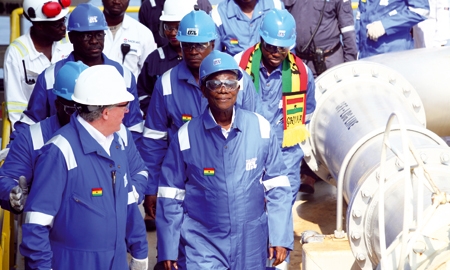
When oil reserves were discovered 60km (37 miles) off Ghana’s Atlantic coast in June 2007, it turned out to be one of the biggest oil finds in West Africa. Production at the Jubilee field began just 42 months later in December 2010 – the fastest turnaround in the modern history of the energy sector and a reflection of its importance to the socio-economic development of Ghana.
“I do not think anybody believed we could do it in that time frame,” says Aidan Heavey, founder of Tullow Oil, the London-based operator responsible for the find and one of its operating partners. “When you consider that all this development happened at the time of the global financial crisis, banks were in turmoil and credit was tight, yet we managed to get the project done in record time. There are very few countries that could actually achieve that. You really do need all the institutions of government to be working for you.”
| “...all this development happened at the time of the global financial crisis... yet we managed to get the project done in record time.” Aidan heavey, Founder of Tullow Oil |
This year, crude oil output from Jubilee will range from 70,000 to 90,000 barrels per day (bpd). Initial plans to produce 120,000bpd have been rescheduled for 2013 to ensure full risk management at the site can be carried out responsibly. “This is a new field; we cannot rush it. We cannot push to ramp up production to get high numbers so everything looks great, and then we damage the wells,” Mr Heavey told Ghana’s Business and Financial Times newspaper.
However, the Jubilee field does not just contain oil; there is also thought to be up to 1.2 trillion cubic feet of gas, more than enough to cover the entire country’s power needs and have excess to export across West Africa and beyond.
The Ministry of Energy plans to encourage more Ghanaians to use liquefied petroleum gas (LPG), instead of wood fuel, when a new plant comes on stream to process natural gas from the Jubilee field in 2013. The intention is to increase the use of LPG in domestic and public institutions from the current level of 12 per cent to 50 per cent. Back in 1989, the government embarked on an LPG promotion campaign aimed at reducing wood fuel consumption. The initiative resulted in an increase in LPG usage from 5,267 tonnes in 1989 to 32,000 tonnes in 1996 and 178,400 tonnes by the end of 2010.
“We are looking after the oil, the government is looking after the gas; and so what we are looking at is how to manage the field,” says Mr Heavey. “Whether we produce gas or not is not going to affect the 120,000 barrels [target for 2013].”
Tullow Oil operates Jubilee in partnership with Kosmos Energy (23.49 per cent), Anadarko Petroleum (23.49 percent), the Ghana National Petroleum Company (13.75 per cent) and Sabre Oil and Gas (2.81 per cent). The company and its partners have pledged to invest at least $4m on developing new oil fields off the Ghanaian coast.
Revenues from the burgeoning petroleum industry are expected to help boost other key areas of Ghana’s economy, such as mining and agriculture. At present the mining industry accounts for around 5 per cent of GDP, with various mined minerals and natural gas accounting for almost 40 per cent of Ghana's total exported goods. Agriculture, meanwhile, currently provides employment for more than half the country’s population and accounts for half of Ghana’s GDP.
0 COMMENTS